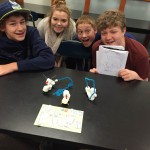 Research: A study by Jean Twenge in Clinical Psychology Review uncovered a dramatic shift in the indices of anxiety and depression among young people in the last half century, with an 80% increase from 1960 to 2002. Her theory behind it lies less to do with the state of the world, the economy, or other extenuating circumstances, and more to do with how children are taught to value their own worth. Twenge notes that anxiety and depression correlate with a sense of lacking control over one’s life or destiny, and is consistent with a societal shift from intrinsic goals (personal development or well-being) to extrinsic (primarily materialistic) goals. In schools this presents as a shift from a focus on developing independence and personal abilities to a focus on grades and testing, and adult-driven decisions about how children spend their days.
Research: A study by Jean Twenge in Clinical Psychology Review uncovered a dramatic shift in the indices of anxiety and depression among young people in the last half century, with an 80% increase from 1960 to 2002. Her theory behind it lies less to do with the state of the world, the economy, or other extenuating circumstances, and more to do with how children are taught to value their own worth. Twenge notes that anxiety and depression correlate with a sense of lacking control over one’s life or destiny, and is consistent with a societal shift from intrinsic goals (personal development or well-being) to extrinsic (primarily materialistic) goals. In schools this presents as a shift from a focus on developing independence and personal abilities to a focus on grades and testing, and adult-driven decisions about how children spend their days.
Stop Hovering, Your Child Needs to Be Creative
 Research: Adam Grant of the University of Pennsylvania published an article over the weekend entitled “How to Raise a Creative Child. Step One: Back Off.” He reviews a number of studies about child prodigies and their ensuing careers and concludes that the way a child is raised can either encourage or thwart their creativity and what they achieve in the future. He notes that most prodigies never reach their full potential because they conform to adult expectations and interests, effectively becoming “excellent sheep.” The parents of highly creative people have few rules, encourage their children to find joy in their work, and respond to their intrinsic motivation and curiosity. Above all, they support their children’s passions, not their own.
Research: Adam Grant of the University of Pennsylvania published an article over the weekend entitled “How to Raise a Creative Child. Step One: Back Off.” He reviews a number of studies about child prodigies and their ensuing careers and concludes that the way a child is raised can either encourage or thwart their creativity and what they achieve in the future. He notes that most prodigies never reach their full potential because they conform to adult expectations and interests, effectively becoming “excellent sheep.” The parents of highly creative people have few rules, encourage their children to find joy in their work, and respond to their intrinsic motivation and curiosity. Above all, they support their children’s passions, not their own.
Practice: These findings have big implications for schools, where kids spend a good deal of their day. At Chrysalis we encourage creativity by creating an environment where out-of-the-box thinking isn’t just accepted, it’s required on everyone’s part! We place a great deal of emphasis on finding children’s strengths and place them in educational programs where they will be able to incorporate their passions and interests into their learning. It means they spend more time in their areas of strength to further develop them, feel success, and develop a breadth of knowledge around them.
Developmental Levels
 Research: Most children are placed in classrooms based solely upon their birth date. Forgotten is the fact that brain function is highly individualized, developing at different times and rates for every individual. Margaret Semrud-Clikeman of the University of Minnesota warns that instruction that is above or below the maturity level of a child’s brain is inappropriate and can lead to behavior problems. Even worse, it can also lead to the misidentification of learning challenges and put a child on the path for academic failure. She argues that being aware of these developmental differences is important so teachers can both adequately challenge and nurture their students to promote academic growth.
Research: Most children are placed in classrooms based solely upon their birth date. Forgotten is the fact that brain function is highly individualized, developing at different times and rates for every individual. Margaret Semrud-Clikeman of the University of Minnesota warns that instruction that is above or below the maturity level of a child’s brain is inappropriate and can lead to behavior problems. Even worse, it can also lead to the misidentification of learning challenges and put a child on the path for academic failure. She argues that being aware of these developmental differences is important so teachers can both adequately challenge and nurture their students to promote academic growth.
Practice: We base our practices on what’s developmentally appropriate for each individual child. We have flexibility in determining which grade, campus, courses, and types of instruction a child receives. We can accommodate a variety of educational paths that allow for variations in brain maturity and developmental readiness, including later school starts in the primary years (some are ready at 5, others when they’re 7), early/late placement in high school courses, and postgraduate years for students who need a little more time before college. This way, we ensure that every child’s path is tailored to their own personal development.
“Hack School”
 Research: In our quest to implement our burgeoning makerspace, a team from Chrysalis toured Microsoft last week to see their version, called “The Garage.” While the space itself was inspiring, as they have access to the latest and greatest technology, even more so was the philosophy, attitude, and community that surround it. Our guide, Steve Scallen, reinforced the importance of what he termed “hack culture,” which can be summarized as a penchant for disrupting the conventional or safe way of doing things by asking how else it could be done. An organization that promotes hack culture understands there are many ways to get things done that are meaningful and valuable.
Research: In our quest to implement our burgeoning makerspace, a team from Chrysalis toured Microsoft last week to see their version, called “The Garage.” While the space itself was inspiring, as they have access to the latest and greatest technology, even more so was the philosophy, attitude, and community that surround it. Our guide, Steve Scallen, reinforced the importance of what he termed “hack culture,” which can be summarized as a penchant for disrupting the conventional or safe way of doing things by asking how else it could be done. An organization that promotes hack culture understands there are many ways to get things done that are meaningful and valuable.
Practice: Applying Scallen’s ideas to Chrysalis, you could say we “hack school!” We often reject the traditional ways that schooling is done in favor of more effective ways to get better results. Where most schools’ practices are dictated by what’s most economically efficient, we look at what’s most efficient for learning, basing our practices on what’s best for the brain and learning at each developmental stage. This happens at many levels…from the construction of nontraditional schedules to alternative demonstrations of what kids know. Hack on, Chrysalis!
Student Voice
 Research: Russell Quaglia, President and Founder of the Quaglia Institute for Student Aspirations, conducted a study on the importance of student voice in schooling and student achievement. He found that students who are engaged are 16 times more likely to want to do well in school and concludes that “students who feel respected and have a sense of control and purpose over what they do at school have a much greater chance of doing well.”
Research: Russell Quaglia, President and Founder of the Quaglia Institute for Student Aspirations, conducted a study on the importance of student voice in schooling and student achievement. He found that students who are engaged are 16 times more likely to want to do well in school and concludes that “students who feel respected and have a sense of control and purpose over what they do at school have a much greater chance of doing well.”